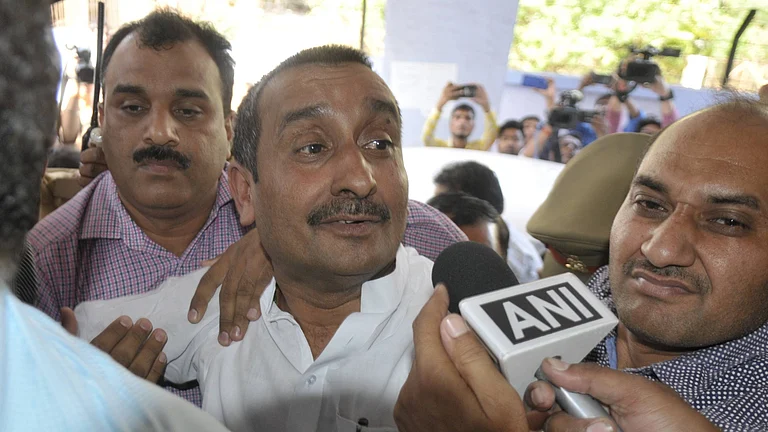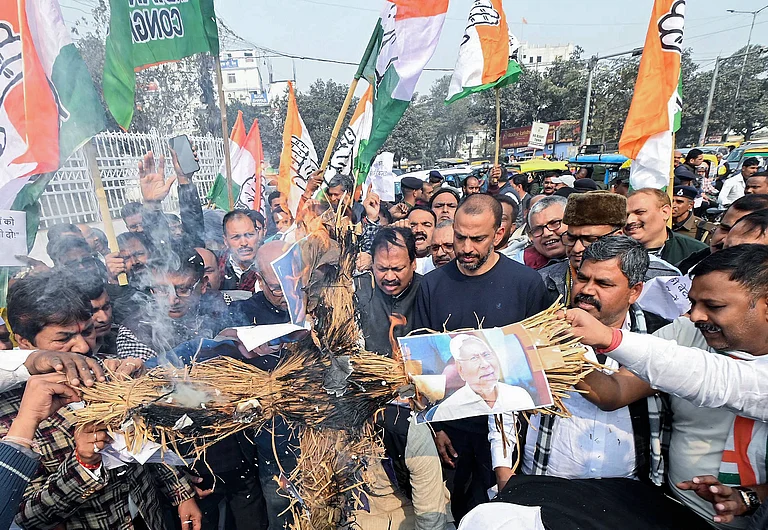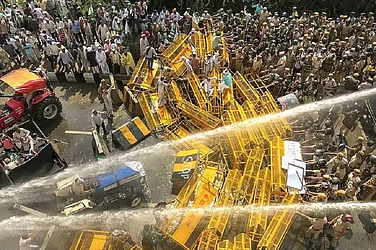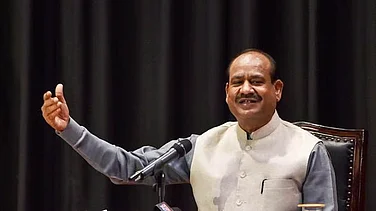The recent rape and murder of a resident doctor at RG Kar Medical Hospital in Kolkata forces us to confront yet another unbearable tragedy, one among countless others—both the ones that make headlines and the many that remain hidden in silence. In this tragic landscape, the "perfect victim" is often the one who does not survive. Those who do are subjected to relentless victim-blaming, where grotesque euphemisms like "surprise sex" are used to downplay the brutality, as though women in public spaces somehow invite such violence. This deeply ingrained mindset, stretching across borders, reduces women to objects of male entitlement, leaving survivors not only to grapple with their trauma but also to bear the crushing weight of society's distorted judgment. In our world, it is the dead who are sanctified as the "perfect" victims—too innocent to be condemned—while the living are burdened with shame, suspicion, and cruelty from a society entrenched in patriarchal, punitive norms. For marginalized women, these barriers are especially harsh and unyielding, making their struggles even more daunting.
Consider the case of Aruna Shanbaug, whose assault left her in a vegetative state for 42 years until her eventual death. Aruna became the face of a silent suffering, her body a battlefield, her mind imprisoned. Society rallied for her, but only when her body failed her completely. She never had a voice for her dignity, never sought justice as a living person—her suffering was monumental because she never got the chance to speak.
Contrast this with Nirbhaya, whose brutal gang rape and subsequent death stirred the nation into a rare fury. She became a symbol of national rage, a martyr for a cause too often brushed under the rug. But what if she had survived? Would she have been celebrated or scrutinized for how she lived after that? In death, Nirbhaya became the "perfect victim"—unquestionable, irreproachable. Alive, she might have been asked why she was out at night, whether she fought back enough, whether she had brought it upon herself in some way.
Then there is Bhanwari Devi, a fearless social worker from Rajasthan, survived a brutal gang rape and, unlike so many others, lived to recount her ordeal. Yet, she was abandoned by the very institutions meant to protect her—rejected by both the legal system and her own community. Her case, which eventually led to the landmark Vishaka Guidelines against workplace harassment, exposed how society handles survivors: not with compassion, but as unwelcome symbols of its own failures.
In the 1980s and 1990s, Bhanwari Devi's name became synonymous with a fierce wave of rural feminism driven by a marginalised women, her story entwined with Rajasthan’s uphill struggle against child marriage. She represented a shift in feminist leadership—away from urban, privileged circles and toward the marginalized, rural voices that had long been silenced. But Bhanwari’s battle wasn’t only against her assailants or the oppressive caste based customs she fought to dismantle. It was a war waged against a system that refused to see her as worthy of justice. Her voice, unlike that of Aruna Shanbhag or Nirbhaya, was too bold, too unsettling. She wasn’t the "perfect victim"—because she survived, because she spoke, and because she dared to defy the silence society demanded of her.
'Rape'—the word no longer shakes society as it once might have. It is only when the brutality of the act culminates in death that it spurs national outrage, protests, and demands for justice. But must a woman die for her suffering to be seen as real, as legitimate? How many more deaths are required to shake the very foundations of a society that values women in death more than in life?
Despite legislative reforms—stricter punishments, fast-track courts, and efforts at sensitization—the conviction rate remains abysmally low. Between 2018 and 2022, the conviction rate for rape cases hovered around 27-28%. Why? Because of the technicalities—the inefficiencies in prosecution, the lack of trained professionals for evidence collection, and a police force that, too often, lacks the sensitivity to treat rape cases with the urgency and care they demand. And then there’s the judiciary itself, which falters, swayed by deep-rooted patriarchal values that place a woman’s virtue above her voice, and her suffering above her survival.
But the heart of the issue goes beyond legislation. It lies in a society that treats women as objects of lust, power, and revenge—mere vessels for male honour or degradation. It is this mindset that perpetuates the myth of the "perfect victim"—the notion that only a woman who dies is worthy of justice, while those who live must fight not only their attackers but a world determined to find fault in their survival.
The "perfect victim" paradox is a reflection of our society's warped sense of justice, one that is selective in its empathy.
Power versus Women; The Fallacy of Women Empowerment
The recent acts of violence against women, coupled with the responses from women in positions of authority, expose a deeply flawed social fabric and cast doubt on the genuine empowerment of women. However, those in power often find themselves conforming to a system rooted in patriarchal values, sacrificing true progress for the sake of maintaining their political and social ideologies. Rape in India is increasingly politicized, revealing a disturbing landscape where sexual violence is not merely a crime but a tool manipulated within the frameworks of political, legal, and social systems that uphold and perpetuate impunity.
In a civilised society rule of law should be prevailed strictly and not rule of power over women. Misogyny coincided with online incel behaviour is not confined to one region or community, it transcends borders, caste, cultures and public/private workspaces, festering in the dark corners of every society. The new trend of social media justice is less about justice for the victim and more about political agendas, manipulated by IT cells of political parties at their whim. Social media trials, lacking credible information, not only violate laws protecting the victim’s identity but also make it difficult for survivors to obtain justice. Intense victim blaming and shaming frequently compel survivors to retract their statements due to societal pressure, protracted legal battles and threats to their families safety. Courts must delivered before social media coerces the witnesses into silence and impose severe penalties. It's clear that no matter how much we talk about justice on social media, only the courts and better institutional frameworks are required to ensure it.
Loud social media outrage often backfires, either pressuring the state into hasty actions that undermine legal fairness, or it may inadvertently restrict women’s freedoms, ultimately aiding perpetrators and eroding the rule of law. Telangana’s Disha encounter case and Northeast hospital issuing directives limiting women doctors under the guise of safety are examples to corroborate here. As a society, our quick-fix first approach to stopping these crimes—limiting women's access—dampens the empowerment of women altogether. As Kavita Krishnan in her book ’Fearless Freedom’ mentions that “violence against autonomy hides in plain sights, while we fix our focus on rape to the exclusion of what’s being done in the name of keeping women safe from rape”. It implies that certain actions or policies possibly restrictive or oppressive measures are being enacted under the guise of protecting women from rape. These measures, however, may actually undermine women’s freedom autonomy.
“The Illusion of Justice: Why Legal Reforms Fall Short”
One of the root causes behind the prevalence of these crimes is the absence of fear of the law among perpetrators. The probability of being caught is low due to political interference, and even when they are caught under pressure, convictions remain low, hampered by technicalities and the same political influence. Victims need effective support, but our system for women is on ventilator for decades, barely functioning.
The problem extends beyond law enforcement—our judiciary also needs urgent mindset reform to shed its deep-seated misogyny and sexism. Earlier this year, the Supreme Court was outraged by a Calcutta High Court judgment that advised adolescent girls to control their sexual urges, implying they lose in society's eyes when they give in to "the sexual pleasure of hardly two minutes." This is not an isolated instance. In 2022, a Kerala District Court cited a victim's "revealing and provocative dress" as grounds for granting anticipatory bail to the accused. In another case, an 18-year-old gang rape victim was humiliatingly asked by a judge in Rajasthan to strip so he could "see the injury marks." Similarly, the Madhya Pradesh High Court absurdly ordered a molestation complainant to tie a rakhi to her attacker as a condition for his bail. These cases reveal how deeply the judiciary influences societal perceptions, making it clear that the entire system—from the judiciary to law enforcement, media, and political players—needs urgent and comprehensive reform. The criminal justice system must evolve to underscore the critical role of intersectionality in addressing sexual violence cases, acknowledging that marginalized women, especially encounter compounded barriers in their pursuit of justice. Recognizing these layered injustices, is essential for a more equitable approach in legal system. We all have a stake in this, and it's time to address these systemic failures before more lives are irreparably damaged.
In the face of relentless violence against women, who will rise to bear the weight of these grave injustices? Our legal and political systems falter, yet the responsibility transcends the state, resting upon every institution and individual with the power to effect change. To build a equal society, we must shatter the chains of impunity, dismantle patriarchal norms, and hold perpetrators to account with unwavering resolve. Yet, justice demands more than punitive measures—it calls for a reckoning with the very foundations of our social and political structures. In a world where women are revered in death but vilified in survival, we find ourselves bound by archaic traditions that sanctify women only in their silence or martyrdom. Aruna Shanbhag’s silence, Nirbhaya’s death, and Bhanwari Devi’s unyielding fight are not merely stories of victimhood; they are a damning reflection of a society that clings to old customs, honoring women only in their absence. True justice remains elusive, not due to a lack of legislations and system, but because of deeply ingrained gender biases prevailing in the society. It is this inertia that sustains harsh judgments, dismissals, and erasures of those who survive to recount their stories.
(Kanwal Singh is a Policy Analyst, Freelance Columnist, Peace builder and Sagina Walyat is a lawyer at High Courts and works on women & gender rights in India, President SAARC Women Business Council- South Asia)























